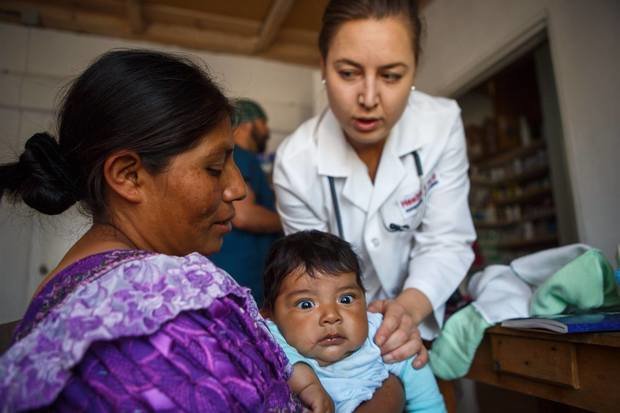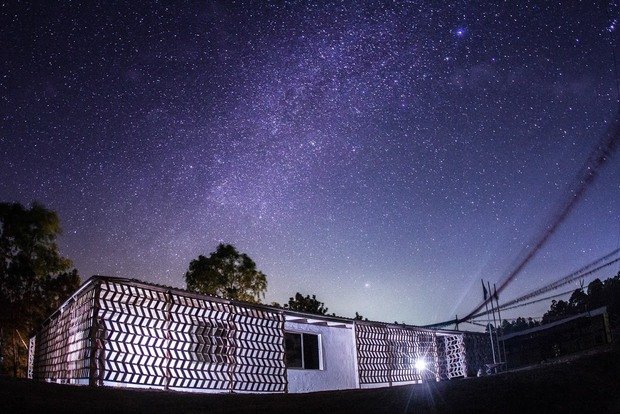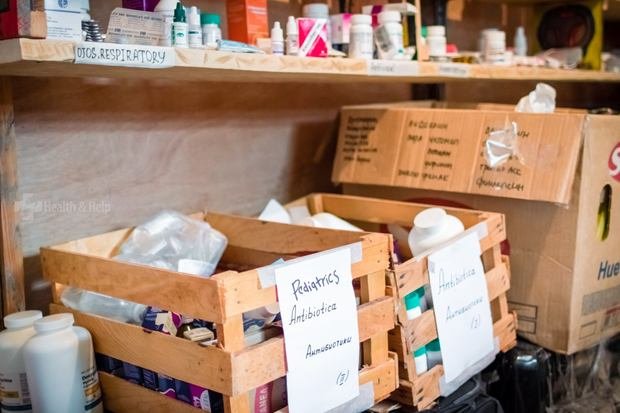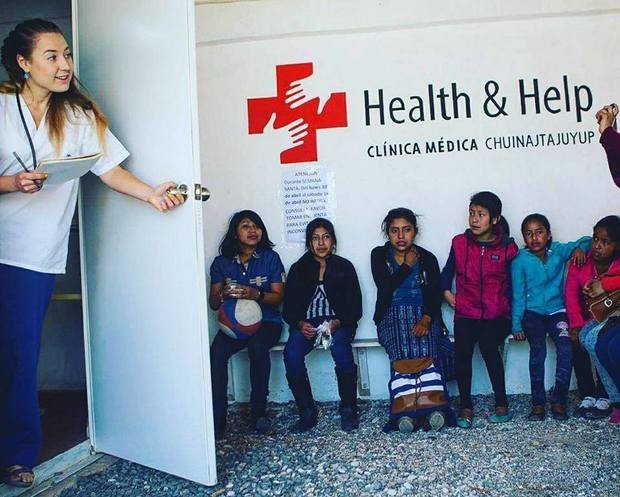''I had a dream of going to a country struck by Ebola epidemic''
Story of a girl from Ufa who built a clinic for the Maya people in Guatemala
Tropicologist from Ufa Viktoriya Valikova has been rendering medical help in the Third World for many years. In 2017, the girl built a clinic for the Maya people in Guatemala within her Health&Help project. Realnoe Vremya reached out to Viktoriya who told about her medical practice, medicine in the Third World and specifics of living in Guatemala. Our interlocutor also told how her project survived, how much the construction of clinics in the Third World could cost and what drove her and her colleagues who provide all the needy with medical help free.
''We were two. We delivered babies, sewed, cured, weighed kids, consulted the population…''
Viktoriya, could you tell about your life before you started constructing clinics in the Third World? Have you ever worked in our hospitals?
I was born in Ufa. I studied medicine in Russia first – I graduated from a medical institute and then had an internship in Infectious Diseases. Then I got a Belgian post-diploma certificate in Tropical Medicine and health organisation in countries with limited resources. As for work in our hospitals, yes, I've worked as infectionist in the admission department of a state hospital in Russia.
What brought you to Guatemala?
I've worked in many countries: in Egypt, in Asia in the Philippines. But right Guatemala was my first lasting trip. When I graduated from the institute in Belgium, I was given a target job placement and offered to choose Africa, Asia, Central and Latin America. I chose Guatemala because the position that was offered there corresponded as much as possible to what I wanted.
I worked in a clinic of a Belgian non-profit organisation in Guatemala for a year. It was a kind of rural health centre. We delivered babies, sewed, cured everybody, consulted the population, fulfilled contraceptive programmes, weighed kids. We were two – me and a midwife from Belgium. I came to occupy the post of medical responsible and worked in two clinics, in fact: I controlled the work in both and saw patients in the clinic where I lived. We lived in the very clinic, worked 24/7. It was fun.
I didn't manage to work until the end of my contract that lasted one year because an armed conflict began in the village, and we were evacuated to the nearest city where I started to work in a public hospital.
I can't say it was a completely conscious choice but neither a sheer coincidence. I consciously started studying tropical medicine. And I did not need to guess where I would be sent to – it was a one hundred per cent Third World country.

I've worked in many countries: in Egypt, in Asia in the Philippines. But right Guatemala was my first lasting trip
What did your family think of that you went to an unsafe place to do quite unsafe things?
Initially, I wanted to go to a country struck by Ebola epidemic, in general – I had a dream. I saw on TV that Ebola was in Sierra Leone and thought: ''My God, I need to go there and save everybody.'' But I wasn't taken, thank God. Those who don't have experience in working with this virus aren't taken to the country with Ebola. Yes, it's unsafe, and my parents worried, of course. I remember when I was studying in Belgium, my mum came and said I needed to think everything out well beforehand. In general, I have very good parents who brought me up with absolute freedom. I've never been forbidden anything. I quiver with terror when I see how others educate their kids by always shouting them: ''Where are you going? What are you doing? No! Don't touch!'' It just kills me.
I did what I wanted, I chose myself where I wanted to study. For instance, I changed my school at the age of 6. I said to my parents I didn't like my teacher. I was asked: ''Why?'', I answered: ''Because he shouts.'' I was said: ''Fine, go and change the school.'' And I did. The same thing happened to the music school, dance classes, art school, English lessons – I had the right to choose everywhere. Some people can suppose that a kid must grow as spoiled and uncontrolled in such conditions. However, I was good at school, I graduated from the institute with honours, visited all possible extra-curricular classes. This is why my decision wasn't a shock for my parents – they knew whom they brought up, and nobody told me I should not go.
''We are one of the few organisations that live on individual donations''
Viktoriya, how did your Health&Help project appear?
After evacuation from Guatemala, I thought it was still early to go home and found a job in a clinic in Honduras. I worked there for about 5 months and then went to Haiti for almost 6 months because I had a strong desire for learning French – I worked in the treatment centre in a Catholic monastery. In that period, it came to my mind that probably I needed to change something in this world and personal life. I had the idea of opening my own organisation that would work where I considered necessary from the desire to bring the maximum benefit in the Third World countries. The case is that a very big number of organisations is located only in tourism regions as well as near capitals and big cities – it's easier to attract volunteers and medical staff there. I thought it was not absolutely correct. I went back to Russia, told everyone about my idea and found a job in the admission department not to twiddle my thumbs. During one of the night shifts, Karina Basharova who had known about me from her friends came to me and offered her help. I was sceptical about it, of course, because there were many people who wanted to help whose desire disappeared after several days of real work. But to my surprise, she waited until I ended my shift, and we've been working together for 2 years already. Karina is a unique person, of course, her self-organisation level and skills in clearly controlling everybody around is very high.

Our clinic works stable now. We began a new project almost one month ago – the construction of a clinic in Nicaragua
We managed to raise money by joint efforts and started to construct the clinic in Guatemala in summer 2016. The work ended in early 2017, and our clinic works stable now. We began a new project almost one month ago – the construction of a clinic in Nicaragua.
What money does your organisation use?
We registered our organisation in different countries mainly to make it for us easier to collect donations and do it officially. We are one of the few organisations that live on individual donations (it is 95% of what we receive). We also get scholarships, but it happens rarely. For instance, once we're given a scholarship to buy medical furniture. In addition, there are physical donations like medicine and a small amount of medical consumables.
We run crowdfunding campaigns – we just have launched a project on Russian Boomstarter platform for the clinic in Nicaragua. We raised all necessary sum for the first work stage within a month – 1,5 million rubles. Now we're raising money for further work. The thing is that there is not any road there, and we will need to lay it ourselves. By the way, we collected 1,3 million rubles for the Guatemalan hospital thanks to crowdfunding.
We also have sponsors and donors who help us every month (from Russia and several other countries). Companies help us sometimes: for instance, one Russian company regularly gives us medicine.
How much did the construction of the clinic in Guatemala cost? Just 1,3 million, right?
We needed about 4 million rubles, and 1,3 million were collected for the first construction stage – for the clinic's skeleton (the foundation, walls, roof).
''Private clinics not always work honestly as well as in Russia''
What is your financial motivation? Do you have it, in general?
The money we make (i.e. nothing) seems to me quite weak motivation ( laughing). Our non-profit organisation has two gimmicks: firstly, we live due to donations of individuals, secondly, we don't have salaries. We all live thanks to some income. Karina and I lease flats and live on this money. Somebody makes additional money at a distance. I also consult online on travel medicine – it's the most frequent additional job for tropicologists. Somebody copyrights, somebody puts photos and lives thanks to it.
A great pleasure from what we do is the real motivation for me. I can say for myself – I feel very needed here. I don't like much when people die and I like very much when they recover and feel better. And it's very cool we are a reason for it. One can work in a regional polyclinic and consult 20 or 40 patients a day, it will be your contribution – it's cool and not a shame, it deserves respect. One can also build clinics and help 25,000 people – in fact, you do the same and also help people who are not better or worse than those who live in Russia or in any other country. They are the same people – kids, pregnant women, old people who also need help.
When we arrange the work of the two clinics, we will build the third one. When we arrange the work in these three clinics, we will build the tenth one. We will try to do what we can do and what we will have the strength for because I think it's a crime when you can help five people but help only one.

We also have sponsors and donors who help us every month (from Russia and several other countries). Companies help us sometimes: for instance, one Russian company regularly gives us medicine
Viktoriya, what do you think of the level of medicine in the third world countries?
In general, the level is quite low. Public medicine is very corrupted, and the money given for it isn't enough, in general. The situation is better in capitals and big cities, especially if somebody is interested in the development of some specific division.
In general, we quite often don't have materials and almost never have medicine. This is why people have to buy everything themselves, while there are establishments where one can get free medical help. Yes, you will have a free consultation. However, you will have to buy the materials (threads, gloves, medicine, etc.) in a pharmacy yourself.
There are pharmacies there but with inflated prices. There is a very small number of doctors and medical staff even in hospitals. In Guatemala, medical education isn't free, so all doctors try to open private clinics and medical rooms that, unfortunately, not always work honestly as well as in Russia. Such doctors prescribe a huge number of analyses very often, sell unnecessary dietary supplements and medicine they got interest for.
The situation in the countryside is just a failure. There are health centres where there is no medical staff, in general, there isn't medicine, bandages – nothing. Kids are sometimes given vaccines there – at best. For this reason, most of the rural population (the majority in the country) isn't protected, and nobody wants them to have a normal life. It is our major target audience. We also help the public sector of medicine a lot: if we get more medicine than we need, we share with other hospitals.
''People with scorpion bites often come to the clinic – it's fatal but it hurts and very unpleasant''
Viktoriya, could you recall the horrendous case in your work that you faced while working outside Russia?
Not a spider that bit your arm, and you're running in panic and didn't know what to do is the awful thing for a doctor in the Third World countries. The awful thing is when a person with a banal disease come to you, but you anyway send him home to die. You say to him: ''Look, man, you will die.'' He asks: ''Why?'' And you say you don't have medicine. And he doesn't have the money to buy them. It's the most awful thing that can happen. You know what it is, you know how to cure it, but you have nothing. We actively fight against it.
Meanwhile, we have poisonous spiders, poisonous snakes (for instance, a coral snake), people with scorpion bites often come to the clinic – it's fatal but it hurts and very unpleasant. We also deliver babies. By the way, if you do it in Guatemala, the kid is named after you or people ask you how to name it. It is very funny.
Once a kid died from intestinal worms: his intestines were full of Ascaris worms. As a result, he had an intestinal blockage. When we took him to the hospital, he started to vomit these worms and died right on the way. So we actively get rid of parasites among kids: we have a very big programme for starving kids. And the first thing we do, in fact, we give pills to them or anti-worm syrups.
You mentioned scorpions, spiders and other unpleasant animals…
Scorpions live in our souls…
Have you ever been bitten?
I have, of course! A spider had been living in my room for a long time, though it did not bit, of course. A coral snake lived in the old bathroom, everyone was afraid of it a lot, two people went to have a shower – one was watching out, the other was taking a shower ( laughing).
In general, we try to do so that nobody is bitten by anything, we tell volunteers about security measures. Our volunteers just like to take photos with some animal. I say they shouldn't do it and grasp scorpions, snakes and others by their tales for a good selfie.

Most of the rural population (the majority in the country) isn't protected, and nobody wants them to have a normal life. It is our major target audience
I have the last and quite general question: could you describe life in Guatemala?
Life in Guatemala for the locals and our volunteers is a bit different. People who live in the countryside wake up at about 4-5 a.m. depending on whether it is a rainy season or dry season and go to work in the field. They work there all day long and are back at 6-7 p.m. when it starts to get dark. Women giver to birth to many babies: an average indicator in the village is 8-10 kids. All people are very poor, the houses are built of soil and fir needles, they usually don't have floors. Rich families have plancha – it's a kind of furnace, those who are poorer cook over an open fire.
Better-off residents have a toilet, and those who are very poor do it in the field. Nobody has a shower – water is heated up in casseroles and people use it about once a week. People mainly eat maize, beans, rice. Those who are richer have animals and they eat meat. And those who are ''on the edge'' eat maize only.
Life for our volunteers is easier because we have a shower that we call suicidal because electrical discharges that heat the water go through the shower head. The volunteers live in the clinic, they have three rooms where they sleep in bunk beds. In addition, we have a kitchen and dining room. We used to cook on a fire, but now we have gas tanks. There is a lot of shamanism in Guatemala, and we are friends of local shamans: we performed rituals first to be able to build a clinic and then had rituals to be able to open them. Although we don't believe in such things a lot, we do it anyway. It's a kind of sign of respect.
There are many political parties there: the rights, the lefts and so on. As we're an apolitical and non-religious organisation, we are quite far from it all. We love and respect all religions but don't propagate any.